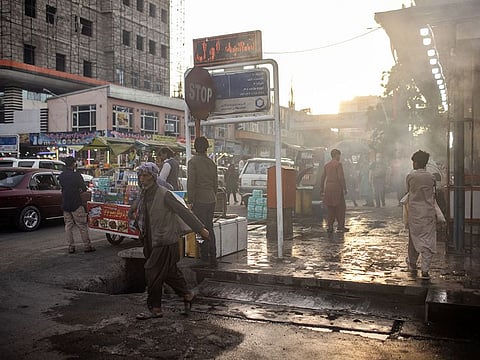Path to peace in Afghanistan is fraught with uncertainties
Regional heavyweights will have to facilitate a political solution

A security nightmare is unfolding in central Asia following a military vacuum created by the departure of American and Nato forces from Afghanistan. Regional countries are scrambling to deal with the aftermath as Taliban forces rapidly advance towards Kabul, capturing border towns in the north and south.
Surrounded by five countries, including Pakistan, Iran, Turkmenistan, Tajikistan and Uzbekistan, Afghanistan falling into Taliban hands will likely create ripples beyond its immediate borders.
On Wednesday, Taliban claimed to have captured Afghanistan’s second-busiest entry point between the Pakistan town of Chaman and the Afghan town of Wesh and the fighters hoisted their flag at the border’s Friendship Gate.
In the south, the Taliban captured another border town of Wesh in Kandahar province last week and now control several border posts in Herat, Farah and Kunduz provinces in the north and west.
The US’ own intelligence estimates say that the Taliban will capture Kabul in six months. But given the speed at which these fighters are advancing, the capital may fall sooner. If that happens, Taliban will take over Afghanistan’s US-trained air force, military bases and hardware left by the western forces, a nightmare for regional heavyweights like India, Iran, Pakistan and China, which yesterday urged the Taliban to break free from terrorist forces and called for political reconciliation with warring Afghan factions.
It is becoming clear that western nations are unlikely to step in even if Kabul falls. Afghanistan’s neighbours will have to deal with the crisis. That is why the ministers of China, India, Kazakhstan, Kyrgyz Republic, Pakistan, Russia, Tajikistan and Uzbekistan met in Dushanbe to discuss Afghanistan. These nations, collectively and individually, must find ways to engage with the Taliban and facilitate a political solution with the Afghan government and other warring factions.
Early this week, the Taliban said that it doesn’t want to fight inside Afghan cities, a promise few believe it will keep. Fighting inside cities and escalating violence will lead to civilian casualties and displacement. Already, according to the United Nations High Commissioner for Refugees (UNHCR), around 270,000 people have been displaced since January and the UN agency has warned of an impending humanitarian crisis.
At the moment, there is no clear path to peace, a process fraught with uncertainties and unpredictable forces. The crisis, however, presents an opportunity to regional powers with conflicting geopolitical ambitions.
In the absence of western intervention, these nations have no option, but to gather around a table and discuss the way forward. The meeting on Wednesday in Dushanbe under the banner of the Shanghai Cooperation Organisation (SCO) is a step in the right direction.



